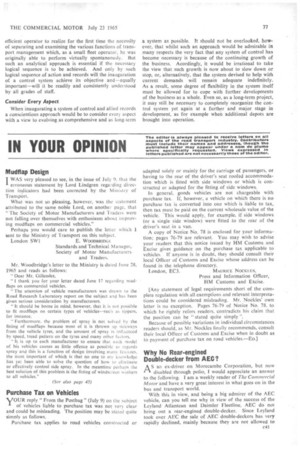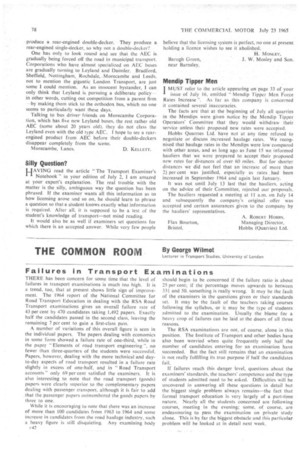IN YOUR OPINION
Page 79

Page 80

If you've noticed an error in this article please click here to report it so we can fix it.
The editor is always pleased to receive letters on all aspects of the road transport industry. Contributors must Include their names and addresses, though the published letter may appear under a nom de plume where specifically requested. Views expressed in letters published are not necessari I y those of the editor.
Mudflap Design
I WAS very pleased to 'see, in the issue of July 9, that the erroneous statement by Lord Lindgren regarding direction indicators had been corrected by the Ministry of Transport.
What was not so pleasing, however, was the statement attributed to the same noble Lord, on another page, that "The Society of Motor Manufacturers and Traders were not falling over themselves with enthusiasm about improving mudflaps on commercial vehicles."
Perhaps you would care to publish the letter which I sent to the Ministry of Transport on this subject.
London SW! E. WOODBRIDGE Standards and Technical Manager, Society of Motor Manufacturers and Traders.
Mr. Woodbridge's letter to the Ministry is dated June 28, 1965 and reads as follows: " Dear Mr. Gillender,
" I thank you for your letter dated June 17 regarding mudflaps on commercial vehicles.
The attention of vehicle manufacturers was drawn to the Road Research Laboratory report on the subject and has been given serious consideration by manufacturers.
"It should be borne in mind, however, that it is not possible to fit mudflaps on certain types of vehicles—such as tippers, for instance.
" Furthermore, the problem of spray is not solved by the fitting of mudflaps because most of it is thrown up sideways from the vehicle tyres, and the amount of spray is influenced by speed, tread pattern on the tyres and many other factors.
" It is up to each manufacturer to ensure that each model of his vehicles causes as little offence as possible as regards spray and this is a function of design involving many features, the most important of which is that no one to my knowledge has yet been able to solve thc question of how to eliminate or effectively control side spray. In the meantime perhaps the best solution of this problem is the fitting of windscreen washers to all vehicles."
Purchase Tax on Vehicles
"¼/OUR reply " From the Postbag" (July 9) on the subject of vehicles liable to purchase tax was not very clear and could be misleading. The position may be stated quite simply as follows.
Purchase tax applies to road vehicles constructed or adapted solely or mainly for the carriage of passengers, or having to the rear of the driver's seat roofed accommodation which is fitted with side windows or which is constructed or adapted for the fitting of side windows.
In general, goods vehicles are not chargeable with purchase tax. If, however, a vehicle on which there is no purchase tax is converted into one which is liable to tax, then tax must be paid on the current wholesale value of the vehicle. This would apply, for example, if side windows (or a single side window) were fitted to the rear of the driver's seat in a van.
A copy of Notice No. 78 is enclosed for your information; pages 76-79 are relevant. You may wish to advise your readers that this notice issued by HM Customs and Excise gives guidance on the purchase tax applicable to vehicles If anyone is in doubt, they should consult their local Officer of Customs and Excise whose address can be found in the telephone directory.
London, EC3. MAURICE NOCKLES, Press and Information Officer, HM Customs and Excise.
[Any statement of legal requirements short of the complete regulation with all exemptions and relevant interpretations could be considered misleading. Mr. Nockles' own letter is no exception. Pages 76-79 of Notice No. 78, to which he rightly refers readers, contradicts his claim that the position can be "stated quite simply ".
Because of possible variations in individual circumstances readers should, as Mr. Nockles finally recommends, consult their local Officer of Customs and Excise when in doubt as to payment of purchase tax on road vehicles.—Eo.]
Why No Rear-engined Double-decker from AEC?
A S an ex-driver on Morecambe Corporation, but now 1-1 disabled through polio, I would appreciate an answer to the following. I am a weekly reader of The Commercial Motor and have a very great interest in what goes on in the bus and transport world.
With this in view, and being a big admirer of the AEC vehicle, can you tell me why in view of the success of the Leyland Atlantean and Daimler Fleetline, AEC do not bring out a rear-engined double-decker. Since Leyland took over AEC the sale of AEC double-deckers has very rapidly declined, mainly because they are not allowed to
produce a rear-engined double-decker. They produce a rear-engined single-decker, so why not a double-decker?
One has only to look round and see that the AEC is gradually being forced off the road in municipal transport. Corporations who have almost specialized on AEC buses are gradually turning to Leyland and Daimler. Bradford, Sheffield, Nottingham, Rochdale, Morecambe and Leeds, not to mention the gigantic London Transport, are just some I could mention. As an innocent bystander, I can only think that Leyland is pursuing a deliberate policy— in other words, cutting out competition from a parent firm by making them stick to the orthodox bus, which no one seems to particularly want these days.
Talking to bus driver friends on Morecambe Corporation, which has five new Leyland buses, the rest rather old AEC (some about 20 years old), they do not class the Leyland even with the old type AEC. I hope to see a rearengined product from AEC before their double-deckers disappear completely from the scene.
Morecambe, Lancs. D. KELLETT.
Silly Question?
HAVING read the article "The Transport Examiner's Notebook in your edition of July 2, I am amazed at your expert's explanation. The real trouble with the matter is the silly, ambiguous way the question has been phrased. If the examiner wants all this information as to how licensing arose and so on, he should learn to phrase a question so that a student knows exactly what information is required. After all, it is supposed to be a test of the student's knowledge of transport—not mind reading. It would also be as well if examiners set questions for which there is an accepted answer. While very few people
believe that the licensing system is perfect, no-one at present holding a licence wishes to see it abolished.
H. MOSLEY, Barugh Green, J. W. Mosley and Son. near Barnsley.
Mendip Tipper Men
I MUST refer to the article appearing on page 33 of your A issue of July 16, entitled " Mendip Tipper Men Force Rates Increase ". As far as this company is concerned it contained several inaccuracies.
The facts are that at the beginning of July all quarries in the Mendips were given notice by the Mendip Tipper Operators' Committee that they would withdraw their service-unless their proposed new rates were accepted.
Hobbs Quarries Ltd. have not at any time refused to negotiate or discuss increased haulage rates. We recognised that haulage rates in the Mendips were low compared with other areas, and as long ago as June 15 we informed hauliers that we were prepared to accept their proposed new rates for distances of over 60 milts. But for shorter distances we did not feel that an increase of more than 2i per cent was justified, especially as rates . had been increased in September 1964 and again last January.
It was not until July 13 last that the hauliers, acting on the advice of their Committee, rejected our proposals.
The hauliers requested a meeting at ii a.m. on July 14 and subsequently the company's original offer was accepted and certain assurances given to the company by the hauliers' representatives.
A. ROBERT 1-10BBS,
Flax Bourton, Managing Director, Bristol. Hobbs (Quarries) Ltd.




























































































































